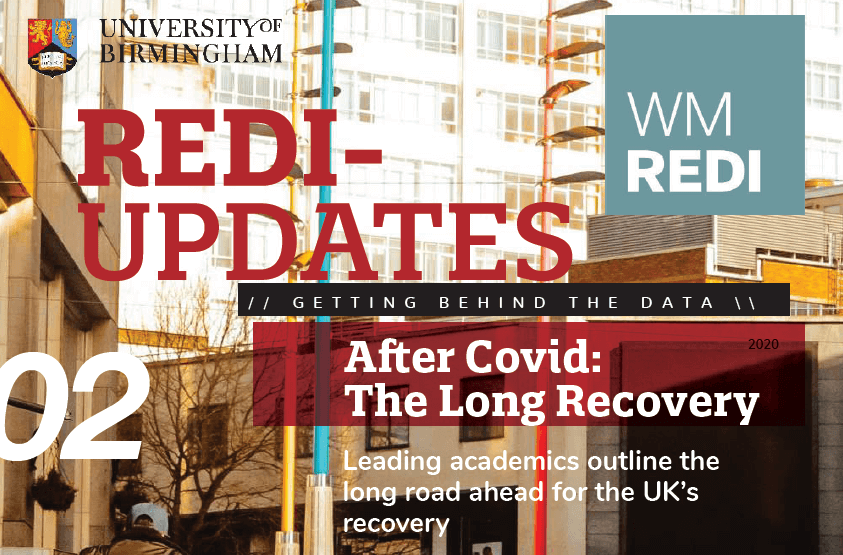
Welcome to REDI-Updates. REDI-Updates is a bi-annual publication which will get behind the data and translate it into understandable terms. In this edition, WM REDI staff and guest contributors will discuss some of the key topics when trying to understand the long-term economic impacts of the pandemic. In this article, Professor Simon Collinson discusses the role of City-REDI / WM REDI in helping to provide regional knowledge exchange, analysis and expertise to support policymakers.
City-REDI was established 5 years ago at the University of Birmingham to strengthen regional knowledge exchange and provide analysis and expertise to support policymakers. It was an investment by the University, one of the longest-standing anchor institutions, for the city-region.
Like local authorities across the UK, the West Midlands Combined Authority, Local Enterprise Partnerships, the WM Growth Company, GBS Chamber of Commerce and city councils are all dealing with a variety of difficult challenges, threats and opportunities as they develop and implement policies to safeguard businesses, jobs and vulnerable communities from the economic impacts of the Covid-19 lock-down. At the same time, they want to invest public funds intelligently, to promote economic growth which is both inclusive (benefitting everyone) and more sustainable in the long term.
Part of our role is to work in partnership with these organisations to help understand these challenges and the kinds of policy interventions that will have specific impacts and effects on industry sectors, businesses, communities and households as we progress through the pandemic and beyond.
We are unique, compared to consultants or other research centres, because we have such a detailed, systemic understanding of the regional economy and our local communities. In order to protect as much of the economy and as many households as possible from the short-term and long-term effects of an economic shut-down, decision-makers want to know, for example:
- Will our regional economy be hit harder than others (and if so, why, how and where)?
- How many job losses are likely, in which industry sectors, with what are the likely impacts on different parts of our region?
- What support should we be providing, to which kinds of businesses to avoid high levels of unemployment?

They also want to understand how we should invest to develop a more innovative, competitive, green and inclusive economy in the future. But also an economy that will be more resilient in the face of future shocks.
- What are the competitive advantages, relative to other UK and global regions, that we should build on, to attract and retain businesses, investment and skilled employees?
- Which assets and infrastructure are worth developing?
- What sectors, technologies, skills should have priority for public funding and business support?
We connect the overall regional economic system and our UK-SEIM model of this system, with different kinds of interventions and investments to understand how they catalyse different kinds of growth. In particular, our impact evaluation seeks to understand trade-offs between productivity, inclusivity and sustainability.
To keep our research relevant we work in close partnership with our stakeholders across the region and nationally, to co-produce analysis and expertise which is directly focused on their challenges. Over the past 3-months, City-REDI / WM REDI has devoted a significant amount of time and resources to supporting the Mayor’s Covid-19 Economic Impact Group (EIG), producing a weekly Impact Monitor containing 30+ pages of data and analysis to outline how the economic impacts of the pandemic are evolving and what can be done to help firms and households through this period. These are presented to the EIG every week, to senior public and private sector representatives from local and national organisations.
This builds on our past work with the Mayor’s office on Brexit, our input into the Midlands Independent Economic Review as a major outcome from the Midlands Engine Observatory, the annual Birmingham Economic Reviews, with our partner, the GBS Chamber of Commerce and many other collaborative projects.
One of the most recent opportunities for all UK regions results from the central government aspiration to ‘build, build, build’ our way out of recession and invest in ‘levelling up’. The key question is, what should we invest in to achieve the above goals? City-REDI / WM REDI played an important role in supporting the development of a £3.2 billion package of regional investment proposals put forward to government in mid-June. By evaluating the impact of various proposals and developing a narrative with evidence to justify the level and types of regional investment needed, we strengthened our collective offer to the government.
While the politics of policy decision-making is complex and unpredictable, economic and societal evidence is clear. A failure to invest to improve the growth prospects of UK regions like ours and reduce inequality across the country will have much greater, more damaging economic, social and ultimately political impacts over time.
This blog was written by Professor Simon Collinson, Director, City-REDI / WM REDI, University of Birmingham.
To sign up for our blog mailing list, please click here.
Disclaimer:
The views expressed in this analysis post are those of the authors and not necessarily those of City-REDI / WM REDI or the University of Birmingham
